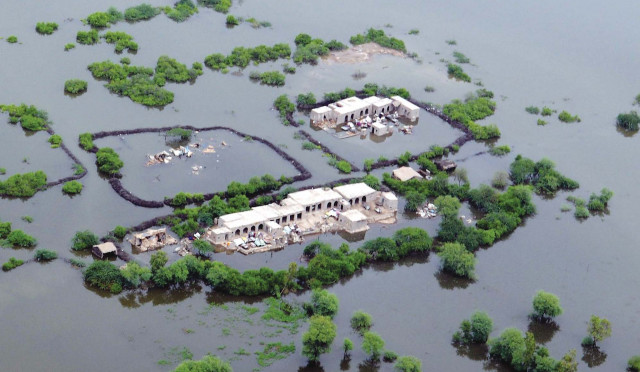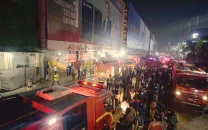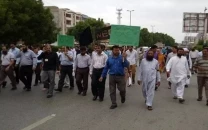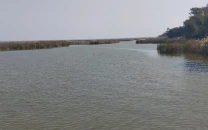Floods 2011: In Badin, problems for survivors mount as waters recede
With cash in hand, people return only to devastated education and health infrastructure .

In its hurry to rehabilitate people, the local administration has sent them back to only a difficult life. For instance, the education and health infrastructure in areas devastated by the floods has not been restored.
But that is a problem for those sent to areas where water has receded. Some people have been sent back to their hometowns that are still under water, putting them at risk of infectious diseases and snake bite.
On closer inspection, the situation appears to be better than it was reported to be. According to media reports, 85 per cent of the people in Badin district were displaced by the flooding. But, locals said, the actual figure is merely 25 per cent. They said that NGOs, media organisations and other groups distorted and exaggerated facts to attract more funding.
The agriculture sector has suffered greatly. Almost 90 per cent of farmland in Badin has been destroyed, which spells disaster for an area where a majority of the population depends on this type of livelihood.
The local administration has paid Rs10,000 per acre to affected people who are farmers or small cultivators i.e. own 25 or less acres of land. Rs30,000 is being provided to families in the form of the Watan Card.
Farmers find this amount enough to live a comfortable life but they have no concept of how crucial access to education and health services is.
The administration also doesn’t seem to concentrate much on that. The only first aid clinic in Fatehabad village, which was run on charity, was completely flooded. It has yet to be cleaned.
On the other hand, clerics seem to be working to convince people that the flooding happened not due to a faulty system but because of people’s “sins” that have incurred the wrath of God. A number of banned militant outfits are also using this opportunity to brainwash people, already disturbed by the huge losses they suffered due to the floods.
Religious organisations such as the Falah-i-Insaniat Foundation (FiF) and the Ummah Welfare Trust (UWT) have a strong presence in the flood-affected areas. Hindu residents of a camp said the FiF had not discriminated in providing aid. The UK-based UWT, whose coordinator said it was there to “provide relief aid and rebuild mosques”, has set up a tent settlement and distributed tents throughout the district.
Seminaries linked to the Jamiat Ulema-e-Islam (Fazl) and the banned Sipah-e-Sahaba Pakistan (now known as Ahle Sunnat wal Jamaat) also contributed to relief efforts. Khalid Hussain, a teacher at the JUI (F)-linked Jamia Ashraful Uloom Farooquia, told The Express Tribune that the seminary had tried its hand at working in disaster zones for the first time.
“We felt that there was a need to help out our fellow human beings, and we were also instructed to act by the Wafaqul Madaris.” According to Hussain, the seminary had distributed Rs300,000 in cash and provided rations to 5,000 families in Tando Bago, Shadi Larj and Jhuddo.
He said objections over the role of religious organisations working in disaster areas did not matter to them, and they would continue to contribute.
Patchy supplies
As for the poor, the supply of relief goods is patchy at best, flood victims say, and several people showed World Food Program cards which only showed one delivery of relief goods, in September. “They come, write their reports and send them to Islamabad,” complained one person about the role of non-profit organisations. But in Jhuddo, an extensive relief goods distribution point was providing cooking oil, food and other rations to hundreds of people.
In Kehar Khan Lund village, residents said National Assembly Speaker Fehmida Mirza, who represents the Badin constituency, was accompanied by a television crew on one visit and left after she was photographed and filmed. Elsewhere, there was praise for Fehmida and her husband, former MPA Zulfiqar Mirza, who have visited the area repeatedly.
Residents of Kehar Khan Lund and adjoining areas also say that they will not be voting for the Pakistan Peoples Party (PPP) again. One man joked that he would vote if he was paid Rs20,000, but another young man took a more serious view. “We will not vote for anyone unless they give a written undertaking that they will provide jobs.”
with additional input by
Saba Imtiaz
Published in The Express Tribune, December 22nd, 2011.



















COMMENTS
Comments are moderated and generally will be posted if they are on-topic and not abusive.
For more information, please see our Comments FAQ